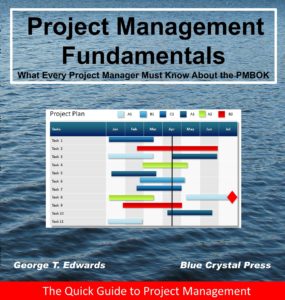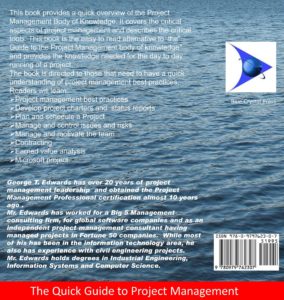$29.95 $19.95
Preface
This books presents the Project Management Body of Knowledge in an easy to read and easy to reference format. It quickly presents what a project manager should do and how it should be done.
By providing a fast and practical overview of the Project Management Body of Knowledge, this book will quickly have the reader applying efficient project management practices and is specifically orientated to people who wish to rapidly grasp what project management is all about.
Every effort has been made to present the concepts in a concise and clear manner, with the result being a book that presents the complex concepts of project management in an easy to use, easy to reference manner.
The book covers the areas of project management knowledge and processes defined by the Project ManagementInstitute. After each process has been described, the book goes on to discuss what all those processes mean in areal project environments and which tools to use.
The structure of the book is such that it can be read from beginning to end, but it can also be used as a reference, with readers consulting specific areas of knowledge.
Readers of this book will learn:
- Project management best practices
- How to write and use charters and status reports
- How to plan and schedule a project
- How to manage and control issues and risks
- How to manage and motivate a team
- Project Contracting
- Earned value analysis
- Microsoft Project
ThiS book also covers material that is not necessarily used in everyday project management but will be useful when taking the project management certification
Who Should Read this Book
The first intended audience is people that must learn Project Management techniques “by the book” and in a very short period of time. Perhaps their projects are already starting and they need to know how they are supposed to kick start the project and runit.
The second intended audience is those seeking a PMP certification. This book presents the core material found in the Guide to Project Management Body of Knowledgeby the Project Management Institute in an easier to read format.
The third audience is those who supervise project managers and need to understand what project management is all about.
Lastly, the fourth audience includes people who participate in projects as contributors, subject matter experts and people with technical expertise who produce the objects to be delivered. While their role by definition is not project management, their careers will be enriched if they learn about project dynamics. Also, they may have to take over some project management responsibilities at some time and, nowadays, employers demand that employees are able to work in a multidisciplinary way. Technical contributors with project management knowledge and experience are sought after by employers. The sections on communications, project estimation and risk management would be very useful for project team members. The summary explanations of the core principles of project management will provide a clear overview of project management.
We believe that there is a great number of people that will benefit from having the project management concepts presented as this book does. As well as being a great reference book in the library of any project team member.
We have also included chapters that contain PMP certification specific materials. The topics covered in that section are areas that a PMP should understand, but the level of detail is more oriented to the PMP certification.
Index
1 Project Management Fundamentals
1.1 Project Management Overview
1.2 Project Management and Its Context
1.2.2 Traditional Triple Constraint
1.2.4 Attributes of a Project Manager
1.2.6 Software Development life Cycle
1.2.7 Projects and Organizations
1.2.9 Projectized Organization
1.2.11 Project Management Office
1.3 Project Management Areas of Knowledge
1.3.1 Project Management Areas of Knowledge
1.3.2 Project Management Processes
1.4 Project Integration Management
1.4.1 Project Integration Management Processes
1.4.2 Portfolio Project Management
1.4.3 Integrated Change Control
1.4.4 Project Definition Components
1.5.1 Project Scope Management Processes
1.5.3 Work Breakdown Structure (WBS)
1.6.1 Project Time Management Processes
Project Time Management Processes
1.6.3 Estimate Activity Resources
1.6.5 Calculating the Project Duration
1.7.1 Project Cost Management Processes
1.8 Project Quality Management
1.8.1 Quality Management Processes
1.8.3 Software quality concepts
1.9 Project Human Resource Management
1.9.1 Project Human Resources Processes
1.10 Project Communications Management
1.10.1 Project Communications Processes
1.10.3 Manage Stakeholders Expectations
1.10.6 Suggestions for Improving Project Communications
1.10.7 Conflict Handling Modes
1.10.8 Running Effective Meetings
1.11.1 Risk Management Processes
1.11.3 Risk Identification Tools
1.11.4 Perform Qualitative Risk Analysis
1.12.1 Procurement Management Processes
1.12.2 The Need for Contracting
1.12.3 Requirements for a Legal Contract
1.12.7 More Contracting Concepts
2 Key Project Management Artifacts
3 PMP Certification and PMP Test Exercises
3.1 The PMP Certification Test
4 Introduction to Microsoft Project
4.8 The MSP Scheduling Formula
5.1 Project Management Historical Milestones

